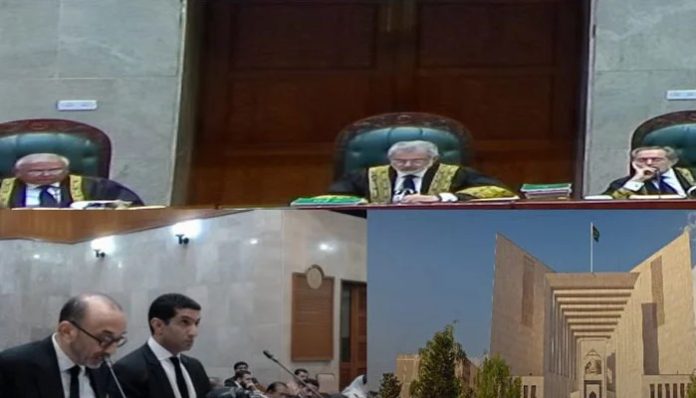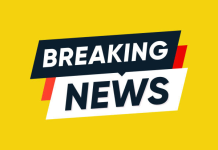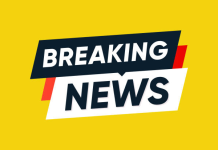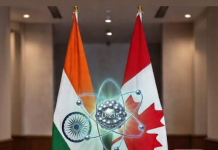DNA
ISLAMABAD: The Supreme Court of Pakistan Tuesday ordered the governments in Centre and Punjab to arrange video-link facility for incarcerated Pakistan Tehreek-e-Insaf (PTI) founder Imran Khan to allow him to present his arguments in the National Accountability Bureau (NAB) amendment case.
“The PTI founder can present his arguments in the upcoming hearing via video link if he wishes to do so […] arrangements should be made for presentation of arguments via video link,” Chief Justice of Pakistan (CJP) Qazi Faez Isa said.
The CJP’s remarks during the hearing of the federal government’s intra-court appeal filed against the apex court’s 2023 verdict that annulled some of the NAB amendments. Khan said he wanted to present his own arguments in the case.
The five-member SC larger bench, headed by CJP Isa, includes Justice Amin-ud-Din Khan, Justice Jamal Khan Mandokhail, Justice Athar Minallah and Justice Hasan Azhar Rizvi.
Today’s hearing comes as a three-member bench of the SC, in September 2023, had approved former prime minister Khan’s petition challenging amendments made to the country’s accountability laws during the tenure of the previous Pakistan Democratic Movement (PDM)-led government.
Headed by then-chief justice Umar Ata Bandial, and comprising Justice Mansoor Ali Shah and Justice Ijazul Ahsan, the court held more than 50 hearings and in its majority 2-1 verdict restored graft cases against public office holders that were closed down following the amendments.
The apex court ordered restoring all graft cases worth less than Rs500 million that were closed down against the political leaders belonging to different political parties and public office holders and declared the amendments void.
The verdict provisions far-reaching consequences as the striking down of the amendments would mean that references against some of the country’s political bigwigs will once again land in the accountability courts.
These include the Toshakhana reference against Pakistan Muslim League-Nawaz (PML-N) Supremo Nawaz Sharif, Pakistan Peoples Party Co-Chairman Asif Ali Zardari and former prime minister Yousuf Raza Gilani, along with the LNG reference against former prime minister Shahid Khaqan Abbasi and the rental power reference against another ex-premier Raja Pervez Ashraf.
Following the verdict, the federal government filed an appeal under Section 5 of the SC law against the apex court’s order.
The previous hearing of the case was held on October 31, wherein the case was indefinitely adjourned and is being heard the first time today since then.
Today’s hearing
At the onset of the hearing, the CJP announced limiting today’s proceedings to strictly legal points and stressed that the case pertains to the validity or invalidity of the amendments pertaining to the anti-graft watchdog.
With Khyber Pakhtunkhwa’s advocate general voicing support for the apex court’s decision against the NAB amendment, the attorney general, on the federal government’s behalf, backed the NAB amendments passed by the Parliament.
Questioning the federal government’s locus standi in the said case, Justice Minallah stressed that only an affected party can file an appeal against a verdict.
“This appeal is not admissible under the Benazir case,” the judge said.
Furthermore, with the CJP underscoring the need for the president to give reasons behind the issuance of an ordinance, Justice Mandokhail said the federal government also has to give reasons as to why it was necessary to pass the ordinance.
NAB amendments
The NAB amendments not only reduced the four-year term of the NAB chairman and the bureau’s prosecutor general to three years, but also placed all regulatory bodies functioning in the country out of NAB’s domain.
Furthermore, the changes included that a three-year term be set for the judges of the accountability courts and that courts be bound to decide a case within one year.
Challenging the amendments, the PTI founder approached the apex court and petitioned that the amendments be struck down on grounds that they were unconstitutional.
The petition argued that amendments to sections 2, 4, 5, 6, 25 and 26 of the NAB law are against the Constitution, along with amendments made to sections 14, 15, 21 and 23.
Furthermore, Khan argued that amendments in the NAB law are contrary to the fundamental rights of Article 9, 14, 19, 24, 25.
All these amendments made in the NAB law should be declared null and void, the PTI founder had requested.
To hear Khan’s plea, a special 3-member bench was formed on July 15, 2022. The first hearing of the case against the NAB amendments was held on July 19 last year after Khan’s lawyer Khawaja Haris filed an application 184/3 against the NAB amendments.
Both the federation and NAB were made parties in the petition.

















